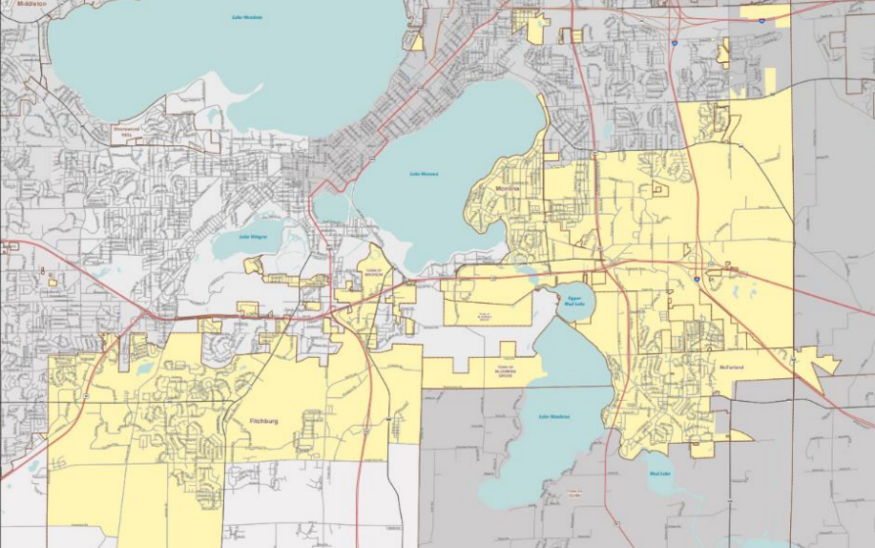UPDATED: Wisconsin Supreme Court orders new legislative maps
By: Steve Schuster, [email protected]//December 22, 2023//
UPDATED: Wisconsin Supreme Court orders new legislative maps
By: Steve Schuster, [email protected]//December 22, 2023//
The 4-3 liberal majority Wisconsin Supreme Court ordered new legislative maps Friday, just months before the 2024 presidential election, sparking praise from Democrats and sharp criticism from the dissent and Republicans.
The majority opinion said, “Wisconsin’s state legislative districts must be composed of physically adjoining territory. The constitutional text and our precedent support this common-sense interpretation of contiguity. Because the current state legislative districts contain separate, detached territory and therefore violate the constitution’s contiguity requirements, we enjoin the Wisconsin Elections Commission from using the current legislative maps in future elections.”
A dissenting opinion authored by Wisconsin Supreme Court Justice Annette Ziegler — which cited an April 2023 Wisconsin Law Journal article — wrote, “the court of four conduct themselves in a manner that lacks accountability and transparency. They exhibit a striking pattern of disrespect for their colleagues, court practices and procedures, the law, and the constitution.”

Ziegler also wrote in her dissent, “This deal was sealed on election night.”
Wisconsin Supreme Court Justice Rebecca Bradley wrote in her dissent that the liberal majority on the court are “handmaidens of the Democratic Party,” and further said they “trample the rule of law, dishonor the institution of the judiciary, and undermine democracy,” points that losing candidate Dan Kelly made on the campaign trial against Protasiewicz.
The ruling says that Wisconsin’s heavily gerrymandered maps unconstitutionally favored Republicans.
In April, former U.S. Attorney General Eric Holder traveled to Milwaukee campaigning for then-Milwaukee County Circuit Court Judge Protasiewicz.
Holder said, Wisconsin “is a state where progressivism was started with Robert La Follette. This is where it all began … people are looking at Wisconsin yet again, to see how democracy can be saved. That is what’s at stake (in the April 2023 election).”
Four of the six past presidential elections in Wisconsin have been decided by fewer than 23,000 votes, according to data obtained by The Associated Press.
Five months after Protasiewicz was sworn in as the newest justice on the Wisconsin Supreme Court her vote was the deciding 4-3 vote that will likely give Democrats a huge advantage next year.
In response, WisGOP Chairman Brian Schimming said, “Democrats have decided to try elections in the courtroom rather than actually earn voters’ trust at the ballot box. By throwing out these maps, left-wing jurists on the Wisconsin Supreme Court have usurped both their authority and the will of the majority of Wisconsinites who favor keeping existing districts.”
As previously reported by the Wisconsin Law Journal, Schimming was called out for his alleged role in organizing fraudulent electors in Wisconsin during the 2020 presidential election.
Wisconsin Assembly Speaker Robin Vos tweeted Friday, “Sad day for Wisconsin when the state supreme court just said last year that the existing lines are constitutional. Fortunately, the U.S. Supreme Court will have the last word.”
In April, Holder noted that Wisconsin ranks alongside Texas as far as the most gerrymandered state in the nation.
According to court documents obtained by the Wisconsin Law Journal, at least 50 of 99 assembly districts and at least 20 of 33 senate districts include separate, detached territory.
Wisconsin Attorney General Josh Kaul said Friday that “today is a great day for democracy in Wisconsin.”
“For over a decade, our state legislature has been elected in a fundamentally undemocratic manner due to partisan gerrymandering. And the consequences have been immense: policies with strong public support have been blocked by — and often haven’t even received a hearing from — the legislature,” Kaul noted.
“Today’s decision marks a sea change. It means that our state legislature will once again be truly democratically elected. The power to determine what direction our legislature takes will again reside where it belongs — with Wisconsin voters. This is a landmark ruling for democracy in Wisconsin,” Kaul added.
Wisconsin Gov. Tony Evers issued a statement Friday praising the court’s decision.
“It’s clear to me that a Republican-controlled Legislature that has consistently gerrymandered itself into comfortable, partisan majorities for more than a decade is incapable of preparing fair, nonpartisan maps deserving of the people of this state. I agree with the Court’s determination that these maps are unconstitutional because the districts lack contiguity. Wisconsin is a purple state, and I look forward to submitting maps to the Court to consider and review that reflect and represent the makeup of our state. And I remain as optimistic as ever that, at long last, the gerrymandered maps Wisconsinites have endured for years might soon be history,” Evers said.
Evers, who was represented by Kaul, previously filed a motion to intervene in the lawsuit before the Wisconsin Supreme Court challenging the state’s current legislative maps.
Later, Evers and Kaul filed a brief requesting the Wisconsin Supreme Court to declare Wisconsin’s legislative maps unconstitutional and institute new maps, “that avoid the partisan bias that has infected Wisconsin’s legislative maps to the detriment of Wisconsin’s democracy.”
Former Wisconsin Gov. Scott Walker downplayed the significance of today’s court decision and said if Democrats go too far the case could go before the U.S. Supreme Court.
Walker tweeted, “Democrat votes are highly concentrated in Milwaukee & Madison. It would take extreme gerrymandering to give liberals certain majorities and would likely violate the Voting Rights Act – leading to a case before the SCOTUS.”
On December 23, State of Wisconsin Election Commissioner Ann Jacobs tweeted that “Parties file their proposed maps and briefs about why they think the court should adopt their maps,” by January 12, 2024 and response briefs are due January 22, 2024.
According to Jacobs Tweet, “experts file written report evaluating the filed maps, if maps don’t comply with/CT’s opinion, they submit their own maps,” by February 1, 2024.
Additional information is available by clicking here.
This story has been updated.
Legal News
- Questions of transparency, leadership responsibility linger over State Bar trust
- Firm demands $4.3M in dispute with Wisconsin client
- Chesebro among those charged with interfering in 2020 election
- Williams-Sonoma must pay almost $3.2 million for violating FTC’s ‘Made in USA’ order
- Harvey Weinstein due back in court, while a key witness weighs whether to testify at a retrial
- Protests erupt on college campuses throughout Midwest, and U.S. over war in Gaza
- Flight attendant indicted in attempt to record girl in airplane bathroom
- Wisconsin attorney loses law license, ordered to pay $16K fine
- Former Wisconsin police officer charged with 5 bestiality felony counts
- Judge reject’s Trump’s bid for a new trial in $83.3 million E. Jean Carroll defamation case
- Dozens of deaths reveal risks of injecting sedatives into people restrained by police
- The Latest: Supreme Court arguments conclude in Trump immunity case
WLJ People
- Power 30 Personal Injury Attorneys – Russell Nicolet
- Power 30 Personal Injury Attorneys – Benjamin Nicolet
- Power 30 Personal Injury Attorneys – Dustin T. Woehl
- Power 30 Personal Injury Attorneys – Katherine Metzger
- Power 30 Personal Injury Attorneys – Joseph Ryan
- Power 30 Personal Injury Attorneys – James M. Ryan
- Power 30 Personal Injury Attorneys – Dana Wachs
- Power 30 Personal Injury Attorneys – Mark L. Thomsen
- Power 30 Personal Injury Attorneys – Matthew Lein
- Power 30 Personal Injury Attorneys – Jeffrey A. Pitman
- Power 30 Personal Injury Attorneys – William Pemberton
- Power 30 Personal Injury Attorneys – Howard S. Sicula












